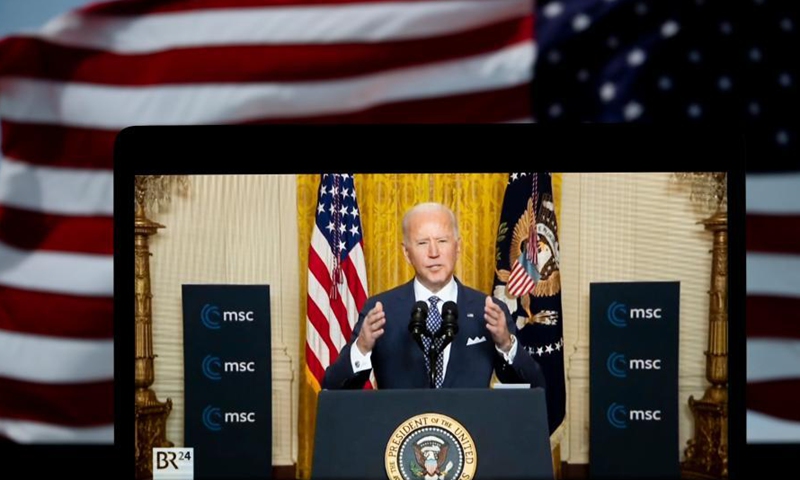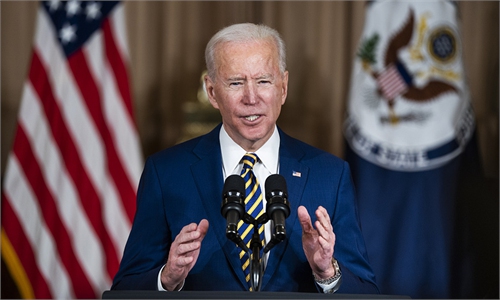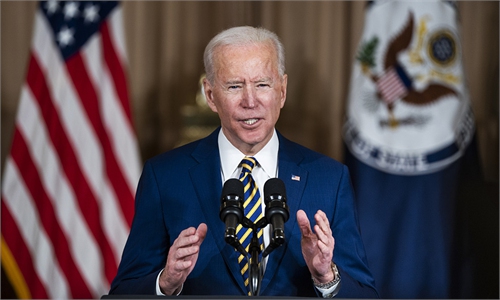
Photo taken in Arlington, Virginia, the United States, on Feb 19, 2021 shows a screen displaying U.S. President Joe Biden speaking in Washington, D.C. during a virtual event with the Munich Security Conference in a video provided by the U.S. State Department. Biden said on Friday that the United States is returning to the transatlantic partnership and will address global challenges like climate change and the COVID-19 pandemic.Photo:Xinhua
The current animosity between China and the US was pushed forward over the past four years by moves taken by the previous US government on trade, technology and health issues.US President Joe Biden's recent statements during the G7 meetings and at the 2021 Munich Conference on international security reflect its electoral campaign thought: strengthening US-Europe linkages in order to confront China and Russia. Again, it seems we are going to live with the weight of a renewed-old McCarthyism during this new-old presidency.
The old capitalist-vs-communist competition has been relabeled democracy-vs-autocracy. Under some respects, the "new" slogan "America is back, ready to lead the world" can be more dangerous than "America First". The first represents the willingness to regain a role the US had after World War II, a role already gone during the last 20 years since the foundation of G20. It was also eroded after the disasters created by a US-led neoliberal globalization, the foundation of the BRICS group, and through the re-emergence of China's international role.
The second ("American First") was an attempt to focus on domestic weaknesses and divisions (something still in place for the new administration), even though it was played largely abroad, especially with China. In addition, we all know the bipartisan anti-China attitude in the US Congress and we all remember Biden's role, as vice president, in the rebalance to Asia-Pacific strategy under former president Barack Obama. Unfortunately, for them, they are outdated and backward in comparison to the current world power balance. Just think the recent establishment of the world's biggest free trade zone, Regional Comprehensive Economic Partnership, and the conclusion of negotiations of the Comprehensive Agreement on Investment between China and the EU.
Recently, Biden recalled the US' international "strategy," already explained in an article published in Foreign Policy almost one year ago (March/April 2020). His speech at the 2021 Munich Conference focused on US-Europe cornerstone partnership to "re-engage with Europe, to consult with you, to earn back our position of trust and leadership."
What is the strategic aim of this will? To counter Russia and China, as stated also in his speech at the State Department at the beginning of February. The "threat from Russia" and the "long-term strategic competition with China" are also references to Indo-Pacific alliances. Instead of building bridges, Biden's multilateralism should be reframed as "the multilateralism of the unilateralist."
Biden's vision of global affairs is summarized as follows: "build a united front of US allies and partners to confront China's abusive behaviors and human rights violations, even as we seek to cooperate with Beijing on issues where our interests converge, such as climate change, nonproliferation, and global health security".
The problem is that the common interests cannot converge if China (and Russia) is assessed so disrespectfully and through ideological lenses. Mutual respect should be re-established. Theoretically, Europe could help to create a bridge between the US, Russia and China, but to do so the EU should find an independent voice. This is very unlikely, at least in the short term. Therefore, we have many elements to argue that the US attempts to dominate the world will not cease, even though, like the EU, they have to deal with greater internal fractures and weaknesses.
As noted by Russian Foreign Minister Sergei Lavrov at the Russian International Affairs Council on December 8, 2020, the key reason why the West is unable to find a consensus with Russia and China is related to its attempt to maintain (or to try to re-establish) a unipolar world order.
The US' launching a geopolitical contest with China "without first working out a long-term strategy" is called "America's biggest mistake" in Kishore Mahbubani's book Has China Won?. He correctly ascertains the US irrationality of approaching today's world affairs with yesterday's strategy. According to me and other scholars, the pandemic accelerated established trends and increased China's status in the world. Why? Because China has demonstrated to protect its citizen and recover its economy better and faster than any other country. It is difficult to find a real US commitment to global welfare in the last decades. The Biden team "should make solidarity" not "leadership" its watchword for approaching the world.
Will the world powers be able to find international consensus for peaceful co-existence? The idea and practice of promoting a community of shared future for humanity remains the most advanced vision and the only way out.
The author is associate professor of International Studies at CFAU, Beijing, teaching also at the International Institute Lorenzo de' Medici, Florence. He is also member of CCERRI think tank, Zhengzhou, and EURISPES, Laboratorio BRICS, Rome. Follow him on twitter @fabiomassimos. opinion@globaltimes.com.cn



